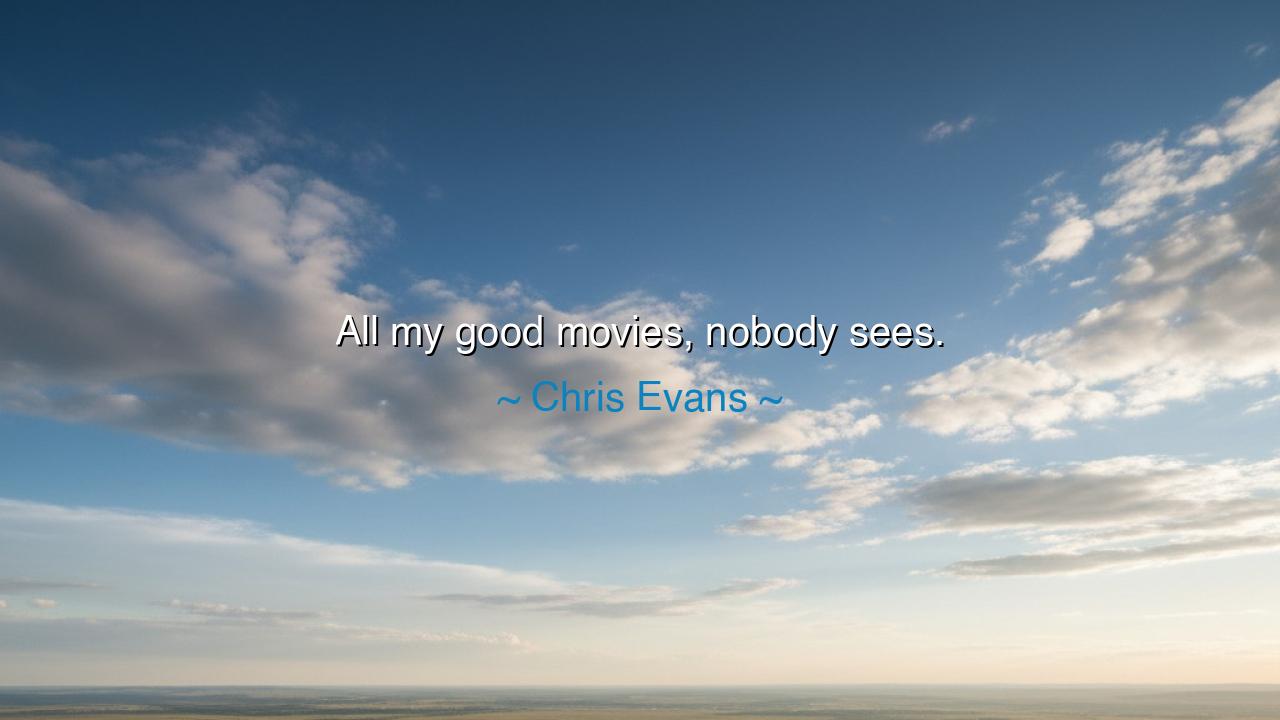
All my good movies, nobody sees.






Hear now, O Seekers of Truth, the sorrowful yet revealing words of Chris Evans, who once said, "All my good movies, nobody sees." In this simple declaration, Evans speaks not only of the disappointment that comes with artistic endeavor, but of the inequities and fate that often accompany the journey of the artist. His words call forth a deep truth about the nature of recognition and success—that even the most noble and meaningful works are not always met with the appreciation they deserve. It is a lament shared by countless artists throughout history—those whose greatest works went unseen or uncelebrated by the masses.
In the days of the ancients, great philosophers and poets faced similar struggles. Consider the life of Socrates, whose wisdom was far ahead of his time. He spoke of truth and virtue, and yet, his teachings were not understood or appreciated by those in power. It was not until after his death that his influence began to ripple through the world, shaping the course of Western thought. Like Socrates, Chris Evans’s most significant works—those films in which he poured his heart and soul—often go unnoticed, overshadowed by the bright lights of blockbuster fame and the expectations of the masses. This is the fate of many creators, who labor in the shadows of commercial success, where their most heartfelt efforts are lost among the noise of popular culture.
In the story of the artist, this is not a tale of defeat, but one of persistence. For even though the world may fail to recognize the brilliance of one’s work, the true artist creates not for the applause, but for the sake of the work itself. Think of the mighty Van Gogh, whose paintings were largely ignored during his lifetime. It was only after his passing that his works were celebrated as some of the greatest masterpieces in the world. Van Gogh’s brushstrokes were not guided by the promise of fame or fortune, but by an inner need to express something deep within him. In this way, Evans’ lament is not one of bitterness, but of resilience—a reminder that even if the world does not immediately recognize your worth, the act of creating is its own reward.
So it is with Chris Evans, who, though widely known for his portrayal of Captain America, speaks of the deeper, more artistic roles he cherishes—roles in films that may not have reached the audiences they deserved. His statement speaks to the conflict that arises when commercial success eclipses artistic fulfillment. Evans has walked the path of the hero on screen, but his words remind us that the artist’s journey is not always one of recognition. Sometimes, the greatest works are the ones that remain unseen, buried beneath the weight of what is popular, what is easy, what the world wants to see. Yet, just as Socrates and Van Gogh found purpose in their truth despite the world’s indifference, so too does Evans continue on his path, a beacon of dedication in the face of obscurity.
In our own lives, O Seekers, let us take this lesson to heart. Success, as the world defines it, is often fleeting and arbitrary. The public’s gaze is fickle, shifting its focus from one trend to the next. Yet, the work we do—the effort we put forth, the truth we express—should not depend on the approval of others. Evans’s words remind us that even the most noble endeavors may go unnoticed, and yet the act of creation is its own reward. Whether you are a writer, a musician, a scientist, or any form of creator, the most important thing is not whether your work is seen by the world, but whether it reflects your truth and your purpose.
The lesson is clear, O Children: do not seek external validation. Create not for the applause, but for the sake of expressing something deeper. Even when the world does not notice, even when your efforts go unseen, remember that the act of creation is an act of truth. Chris Evans teaches us that the journey of the artist is not about fame, but about remaining true to one’s craft, remaining dedicated to one’s vision, regardless of recognition. It is this persistence that ultimately shapes the legacy of the artist—not the fleeting recognition, but the work that endures.
Thus, let us rise above the tides of obscurity, and create with purpose. Let the great works of our lives be the ones that come from the heart, that reflect our deepest truths. Just as Socrates, Van Gogh, and Evans have shown us, the work of the artist is not diminished by the lack of applause. In the end, it is the dedication to one’s craft, the love for the work itself, that makes the artist great. So create, not for the world to see, but for the soul to feel.






AAdministratorAdministrator
Welcome, honored guests. Please leave a comment, we will respond soon